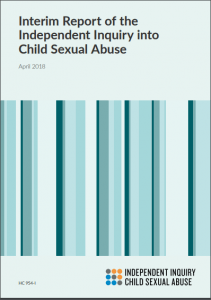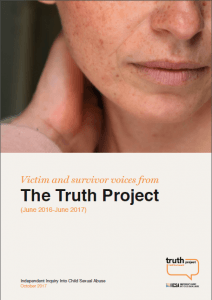Recordkeeping and the IICSA Interim Report
By Victoria Hoyle, on 25 June 2018
 At the end of May my colleague Elizabeth Shepherd and I visited the London offices of the Independent Inquiry into Child Sexual Abuse (IICSA) to talk to staff about the MIRRA project and information rights in social care records. The Inquiry is investigating child sexual abuse in institutions, as well as institutional responses to abuse, and so has a very wide remit including schools, clubs, churches and family home, as well as foster placements and children’s residential homes. (You can find their full Terms of Reference on their website.)
At the end of May my colleague Elizabeth Shepherd and I visited the London offices of the Independent Inquiry into Child Sexual Abuse (IICSA) to talk to staff about the MIRRA project and information rights in social care records. The Inquiry is investigating child sexual abuse in institutions, as well as institutional responses to abuse, and so has a very wide remit including schools, clubs, churches and family home, as well as foster placements and children’s residential homes. (You can find their full Terms of Reference on their website.)
Although the Panel is not exclusively focused on the care-experienced community many of IICSA’s investigations and findings touch on issues that are relevant to our research. The release of the Panel’s interim report in April this year underlined that records and recordkeeping are high on their agenda. The report is a 100+ page summary of the findings and recommendations IICSA has made so far from its 5 public investigations and the 1040 personal accounts of abuse by victims and survivors shared through The Truth Project. The first Truth Project report found that around a quarter of witnesses had experienced sexual abuse whilst in care.[1]
Both reports make for difficult but essential reading, setting out the lifelong impacts of childhood sexual abuse and trauma, and confronting the ways in which our institutions have perpetuated and enabled it. What makes IICSA’s interim report particularly relevant to MIRRA are the numerous references to the importance of records: as evidence for the investigation but also as personal resources for the victims and survivors of abuse.
In some cases they have been critical to the Inquiry’s work. For example, records relating to Knowl View School in Rochdale showed that the local authority had been aware of sexual abuse allegations and had ignored them despite denials made at the hearing.[2] In other cases poor records management or the complete absence of records has frustrated the process. The Royal Overseas League, for example, has kept almost no information relating to its programme for migrating children to Australia.[3] The same was found to be true at Cornwall County Council. The Inquiry stated that this could not be treated as an ‘unwitting oversight’ but ‘indicates a failure to have the welfare and needs of the children as priorities.’[4] The poor quality of recording and the mismanagement of records was an indicator of the quality of care that was received.
 The lack of records or their poor management also ‘caused distress to the former child migrants who were affected’ throughout their lives.[5] The report recognises that poor recordkeeping prevents people from understanding their own histories and identities and delays them finding family members, including living parents and siblings. In the themed findings of the report there is specific recognition that ‘Adult victims and survivors often face difficulties when trying to access records about their childhoods.’[6] Later on the report extends this observation to say that it is true for anyone trying to discover information about their childhood in care.[7] This closely matches what we are finding in our research.
The lack of records or their poor management also ‘caused distress to the former child migrants who were affected’ throughout their lives.[5] The report recognises that poor recordkeeping prevents people from understanding their own histories and identities and delays them finding family members, including living parents and siblings. In the themed findings of the report there is specific recognition that ‘Adult victims and survivors often face difficulties when trying to access records about their childhoods.’[6] Later on the report extends this observation to say that it is true for anyone trying to discover information about their childhood in care.[7] This closely matches what we are finding in our research.
As yet IICSA hasn’t made any recommendations about records and recordkeeping. The current report does mention that the records of former child migrants should be ‘retained and preserved’ using ‘robust systems’ and that all relevant institutions ‘should provide easy access to them’ but this should presumably be extended more widely.[8] It seems as though IICSA is considering just that:
This is a technical and complex area of public policy. There are different rules for the retention of records across the different institutions covered by the Inquiry’s Terms of Reference and the quality of record keeping also varies significantly… The Inquiry will consider whether it can recommend changes that would particularly benefit victims and survivors of child sexual abuse.[9]
During our visit to the Inquiry Elizabeth and I had the opportunity to discuss these changes and how our research could provide evidence to support the Inquiry’s recommendations in this area. The Australian Royal Commission into Institutionalised Responses to Child Sexual Abuse made a very strong and useful set of recommendations around recordkeeping and information sharing in its final report last year that could provide a model for England and Wales.
[1] Independent Inquiry into Child Sexual Abuse. “Victim and Survivor Voices from the Truth Project.Pdf.” IICSA, 2017. 66.
[2] Independent Inquiry into Child Sexual Abuse, “Interim Report of the Independent Inquiry into Child Sexual Abuse.” IICSA, 2018. 43.
[3] Independent Inquiry into Child Sexual Abuse, “Child Migration Programmes Investigation Report.” IICSA, 2018. 109.
[4] IICSA, “Child Migration Programmes Investigation Report.” 112.
[5] “Interim Report of the Independent Inquiry into Child Sexual Abuse.” 40.
[6] “Interim Report of the Independent Inquiry into Child Sexual Abuse.” 68.
[7] “Interim Report of the Independent Inquiry into Child Sexual Abuse.” 72.
[8] “Interim Report of the Independent Inquiry into Child Sexual Abuse.” 40.
[9] “Interim Report of the Independent Inquiry into Child Sexual Abuse.” 72.
 Close
Close


